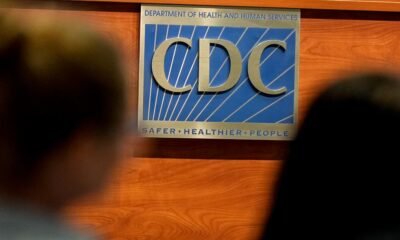Business
Trump Champions Polio Vaccine Yet Skirts Commitment on Others, Slams Media

President-elect Donald Trump reaffirmed his commitment to ensuring the availability of the polio vaccine throughout his upcoming presidency, while voicing intent to scrutinize other vaccines’ safety—a process already undertaken by the U.S. Food and Drug Administration (FDA). His remarks were made during a press conference held at Mar-a-Lago, where he suggested plans for privatizing the Postal Service and announced potential legal action against The Des Moines Register following a poll indicating he was trailing Vice President Kamala Harris.
Trump, set to assume office on January 20, expressed confidence that his administration would resolve the ongoing conflicts in Ukraine and Russia, and set a vision to enhance stability in the Middle East, though he provided no specific strategies. He emphasized a focus on ambitious reforms to reinvigorate economic prosperity, stating, “We’re going to go full prosperity and to build the greatest economy the world has ever seen, just as we had just a short time ago.”
Concerning the leadership of the Department of Health and Human Services, Trump mentioned that he would nominate Robert F. Kennedy Jr., known for his controversial views on vaccines, but suggested that Kennedy’s approach may not be as radical as perceived. He indicated that his administration would welcome evaluations on vaccines without committing to drastic policy changes, particularly regarding military mandates.
Trump also cited the increasing autism rates in recent decades as an area of investigation for his administration, despite extensive studies discrediting links between vaccines and autism. He voiced aspirations to significantly reduce healthcare and prescription drug costs, although specifics were lacking.
During the press conference, Trump announced intentions to pursue multiple lawsuits against media entities and individuals he believes have damaged his reputation. This followed a recent settlement with ABC News in which the network agreed to pay $15 million related to defamatory statements made during a broadcast.
Among his targets for litigation, Trump mentioned Iowa pollster J. Ann Selzer, asserting that the pre-election poll demonstrating Harris’s lead constituted fraud. Selzer responded by indicating that she was still analyzing the unexpected polling results and had not seen any need for adjustments. She expressed confusion over allegations of manipulation regarding the survey.
Trump’s grievances extended to the CBS news program “60 Minutes” and the Pulitzer Prize board, with the latter facing criticism for the awards given to The New York Times and The Washington Post for their reporting on Russian interference in the 2016 election. He demanded that the prizes be revoked and damages paid, although the Pulitzer Prize Board maintained its position following independent reviews that upheld the integrity of the awarded work.
On foreign affairs, Trump stated intentions to address the Israel-Hamas conflict and the Russia-Ukraine war upon taking office. He commended Israeli Prime Minister Benjamin Netanyahu’s performance and anticipated difficulties in resolving the Ukraine crisis. Additionally, he criticized the Biden administration for its military policies regarding Ukraine, suggesting he may reverse decisions regarding strikes into Russian territory.
Questions surrounding Trump’s agenda emerged from the press conference, particularly regarding his stance on the privatization of the U.S. Postal Service and potential actions against TikTok, which is facing operational challenges due to pending legal decisions. He also hinted at the possibility of supporting primary challengers against Republican senators opposing his nominees, leaving many uncertainties about his administration’s direction.


















